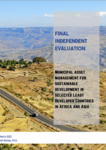Page Header

Downloads:
1
Final evaluation of Development Account project titled Bridging SIDS capacity gaps in the implementation of the 2030 Agenda, with a focus on SDG 14
Overview
1. To build capacity for the achievement of Goal 14 of the Sustainable Development Goals (SDGs) the Small Island Developing States (SIDS) Unit of the United Nations Department of Economics and Social Affairs (UN-DESA) initiated a project titled, “Bridging capacity gaps in the implementation of the 2030 Agenda, with particular focus on SDG 14.” 2. The project ran from September 2018 through June 2022, with six participating countries – Jamaica, Saint Lucia, Cook Island, Kiribati, Nauru, and Tonga – and with a UN Development Account budget of USD $600,000. The project was divided into two components: Caribbean SIDS and Pacific SIDS (Abyssal Initiative). The Caribbean SIDS component included two distinct segments (Jamaica and Saint Lucia) and the Pacific SIDS component was homogenous among its four countries. 3. The Jamaica segment of the project’s Caribbean component yielded the following primary outputs: i. Baseline Assessment Report: Strengthening National Ocean Sector Policies in Jamaica, ii. Monitoring and Evaluation Framework for the Jamaica OCZM Authority, iii. Stakeholder consultations, and iv. Policy Brief: Phase III Consultation on Institutional Arrangements for the Revision and Updating of OCZM Policy. 4. The primary outputs from the Saint Lucia segment of the project are as follows: i. Review and Strengthening of Policy, Legislative and Institutional Capacity to Support Ocean Governance and Delivery of the National Ocean Policy Across all Sectors in Saint Lucia (Baseline report), ii. Monitoring and Evaluation Framework, iii. Infographics for public awareness campaign, and iv. National training course (Blue Economy). 5. The primary outputs from the Pacific component of the project are as follows: i. National and regional capacity building workshops (government officials), ii. Guidelines for negotiations and contractual dealings with sponsored entities, and iii. Roles and responsibilities of states sponsoring activities in the area (Toolkit). 6. In keeping with UN requirements a terminal project evaluation is required for the project. The methodology used for this evaluation includes interviews, desk reviews of relevant documents and questionnaires. Regrettably some of the persons contacted did not respond to emails, or reneged on their commitments to be interviewed. Few persons answered the questionnaire (four stakeholders from each of the two regions responded to the questionnaires). On the other hand, those stakeholders who agreed to be interviewed provided excellent information and context for the project. 7. The COVID-19 pandemic greatly impacted the execution of the project. The project, however, was able to move a significant amount of activity to the online space. As such, some workshops and meetings were moved online. This move was not without its own challenges, online meetings do not allow for sufficient interaction between participants, are susceptible to internet disruptions, and often compete with other national duties and priorities for the participant’s attention. 8. This final evaluation uses six evaluative criteria: coherence, effectiveness, efficiency, impact, relevance, and sustainability. Of these six criteria the TOR explicitly requires four - effectiveness, efficiency, relevance, and sustainability. Each criterion is scored based on a simple four level scale: excellent, good, fair, and poor. While the project served two regions, as the Caribbean SIDS component comprised of two distinct segments three evaluations are done in keeping with these three distinct parts of the project.Report Details
| Year Published | |
| Type | |
| Theme/s | |
| Joint | Yes |
| Partner/s | |
| SDG/s | |
| Consultant name | |
| Agency Focal Point | Anya Ihsan Thomas |
| Focal Point Email | thomasa@un.org |
| Managed by Independent Evaluation Office | No |
| Geographic Scope | Global |
| Country/ies |
YOU 'RE READING
Final evaluation of Development Account project titled Bridging SIDS capacity gaps in the implementation of the 2030 Agenda, with a focus on SDG 14



